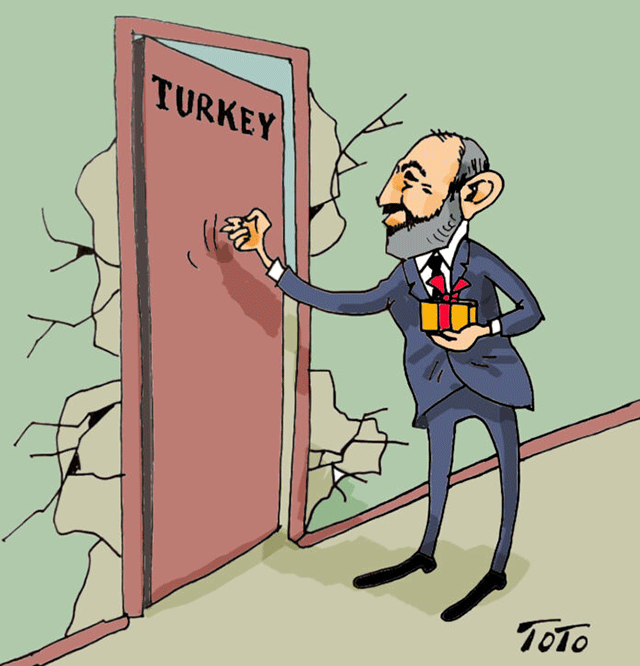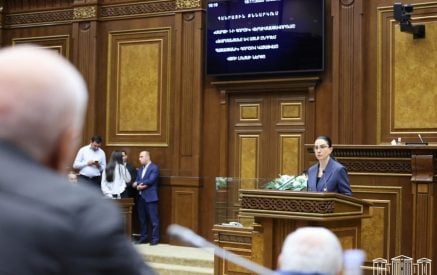by Edmond Y. Azadian
Another hot topic was tossed into the already superheated public debate in Armenia amid the Armenia-Russia standoff, blockaded Lachin corridor and the stalled Armenia-Azerbaijan peace treaty negotiations, among other issues.
Indeed, Prime Minister Nikol Pashinyan’s administration’s initiative to send rescuers and aid to Turkey rocked the news and social media in Armenia. Most opposition voices criticized the initiative, while the government sources and regime-friendly news outlets defended the move, on several grounds. The debate continues to rage in Armenia as worldwide attention is focused on Turkey and Syria, whence traumatic and tragic images of rescue work are being beamed.
Read also
Armenia dispatched a rescue team of 28 to Turkey, accompanied with five truckloads of food, water and medical supplies. Armenia also sent a rescue team of 29 to Syria, while Azerbaijan and Georgia have refused to help Syrians. For the first time in 33 years, Turkey opened the land border at Margara bridge to receive the aid package from Armenia destined to Adiyaman province, one of the hardest hit by the devastating quake of February 6, the epicenter of which was in Gaziantep.
“I will always remember the generous aid sent by the people of Armenia to help alleviate the suffering of our people in the earthquake stricken region in Turkey,” said Ambassador Serdar Kiliç, the lead negotiator for restarting diplomatic relations with Armenia, to his counterpart, Ruben Rubinyan.
Prime Minister Pashinyan called President Recep Tayyip Erdogan to express his condolences, to which Mr. Erdogan replied, “The Turkish government highly values Armenia’s support, emphasizing that step also from the point of view of further deepening the dialog between the two countries.”
Of course, these exchanges do not extend beyond the limits of protocol. However, an optimistic message is emerging from the Armenian side in an effort to justify the initiative. Thus, explains Foreign Minister Ararat Mirzoyan, “We ourselves saw what disastrous consequences an earthquake can have and we were not alone at that time. … There is a dialogue, as you know, about the opening of the borders and the establishment of diplomatic relations.”
Opposition parties in parliament have reacted negatively to the actions. “Turkey opened the Margara border crossing because it needed that and it will keep the border closed until Armenia meets all of Turkey’s demands,” said Arthur Khachatryan, a member of the Hayastan Alliance.
Tigran Abrahamyan of the Pativ Unem party, added, “I don’t think that Armenia’s humanitarian aid and statements of support will be important for getting Turkey to correctly position itself in the Turkish-Armenian relations.”
Outside the framework of the government debate, the media is bursting with commentary, some outlandish and bizarre, asking Turkey to repent or compensate Armenia for the Genocide, or recognize Armenia, in return for the disaster aid.
There is something called disaster diplomacy, which calls for responsible government heads to behave in a certain manner, no matter what the prevailing politics would dictate. In 1999, President Robert Kocharyan sent a condolence message to Turkey, where an earthquake had hit the Izmit area, resulting in 17,000 casualties. Similarly, President Levon Ter-Petrosian attended the funeral of President Turgut Ozel, as the Turkish Red Crescent had sent aid to Armenia during the 1988 quake in Gyumri. Still, few Armenians have forgotten the cheers and whoops of joy from Turkey when the earthquake struck Armenia in 1988.
During all these activities, the existing political conditions did not place an impediment for the states to take humanitarian stands.
If we view Armenia’s aid to Turkey on an emotional level or from the perspective of current political realities, we certainly would refrain from such charitable acts, particularly in view of the message that President Erdogan has sent to President Ilham Aliyev of Azerbaijan, in receiving the latter’s condolences and offer for support. Mr. Erdogan lauded Aliyev for Azerbaijan’s aid, stating that Azerbaijan stands with Turkey just as Turkey stood by Azerbaijan during the 44-Day War.
Armenia must choose the moral high ground, whether Turkey appreciates it or not. It has to live by its own values and should not allow Turkey — or for that matter any other party — to define Armenia. Armenia has to be defined by its own values. As part of the international community, it will be judged by its own policies, which is certainly in line with those of the civilized world.
The magnitude of this earthquake and the devastation in Turkey will certainly serve as a watershed for Erdogan’s maximalist policies in the region and around the world. Turkey and Azerbaijan will never change their political goals but the tremendous resources needed for the recovery will not sustain their ambitions.
All kinds of mercenaries, jihadists and criminal elements sheltered by Turkey for its foreign adventures have already gotten loose and are hampering the rescue activities of foreign groups and they will certainly turn against the Erdogan regime when he cannot control them.
The polls taken before the quake already indicated the declining popularity of Erdogan. The earthquake will certainly lower them further, because he will not be able to meet his deadline of reconstructing the disaster zone within a year.
The recovery effort will need a hefty sum of money from the Western world, particularly from the US, which in return will seek to tame Erdogan’s bullying tendencies, such as his blackmailing of NATO allies by blocking Finland and Sweden’s admission into that structure. Also, he will no longer be able to continue to spite his benefactors by cutting separate deals with Russia, compromising Western interests. Ankara’s policies will become more predictable and controllable as it becomes more dependent on the West.
What’s more, the earthquake has damaged Turkish oil facilities in Iskenderun, at least delaying plans to render Turkey an energy hub through cooperation with Russia.
A configuration of forces was emerging, bringing together Turkey, Azerbaijan and Israel to spark a conflict with Iran. Already Azerbaijan’s war rhetoric and Israel’s drone attacks against Iran have constituted a prelude to a major conflagration in the region, making Armenia so much collateral damage. That adventure would have to be tabled or postponed for an indefinite period, unless Israel goes it alone.
With Ankara’s support restricted and the stationing of European Union observers on Armenia’s borders, Azerbaijan’s belligerence will be contained for a while, allowing a respite for Armenia to recover and rearm (we hope). Ankara’s constant prodding was making Baku keep Armenia under the threat of imminent and perpetual war.
The earthquake will impact Turkey’s domestic politics as well, seriously damaging Erdogan’s chances of reelection on May 14. Either he has to postpone the elections or play a trick to turn away the wave of popular discontent emerging from the disaster. He is already blaming others for shoddy construction and has been touring affected areas with lavish promises of help, which he cannot afford. He has been jailing his critics and has been taking credit for all the foreign help.
The construction boom in the last 20 years seems to be Erdogan’s doom. Most of the contracts during that boom period were awarded to Erdogan’s cronies, who either took advantage of lax building codes or ignored them altogether. During that period, contractors bypassed building codes increasing benefits and putting residents at risk.
A video taken during the 2019 local elections in Marash shows Erdogan bragging that “We solved the problems of 144,150 citizens of Marash with zoning amnesty.”
In another stop in Hatay province, Erdogan announced, “We have solved the problems of 205,000 citizens in Hatay with zoning peace.”
The Turkish publication Duvar, as cited by Insider, writes, “Buğra Gökçe, the deputy secretary general of Istanbul Metropolitan Municipality, as saying that 294,165 buildings in the affected areas had taken advantage of” the 2018 construction amnesties, suspending tough earthquake zone building codes. Forty thousand of those certificates are in the hard-hit Gaziantep region.
The opposition leader Kemal Kilicdaroglu said, “If there is a person responsible for all this, it is Erdogan.”
The opposition is pulling together, seeing an opportunity to unseat Erdogan – something they could not have dared hope a month ago.
Erdogan is a crafty political survivor and it will be interesting to see if he will survive all this by applying his old methods. With or without Armenia’s help, Turkish politics will run their course.


























































